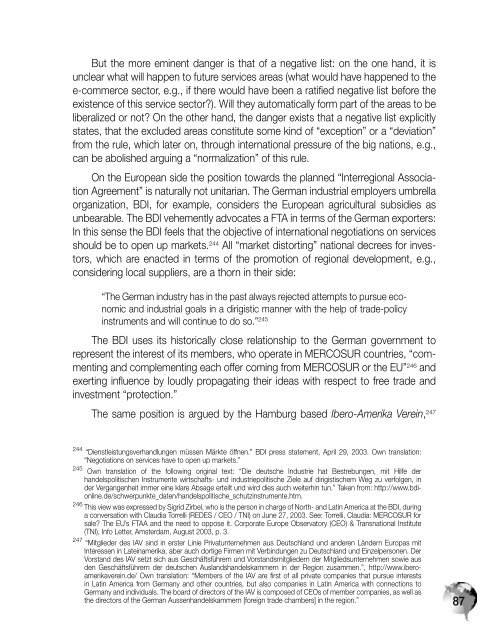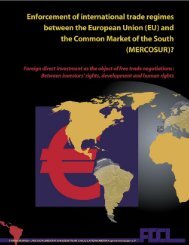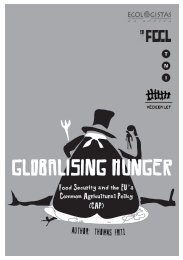(EU) and the Common Market of the South (MERCOSUR)? - FDCL
(EU) and the Common Market of the South (MERCOSUR)? - FDCL
(EU) and the Common Market of the South (MERCOSUR)? - FDCL
Create successful ePaper yourself
Turn your PDF publications into a flip-book with our unique Google optimized e-Paper software.
But <strong>the</strong> more eminent danger is that <strong>of</strong> a negative list: on <strong>the</strong> one h<strong>and</strong>, it is<br />
unclear what will happen to future services areas (what would have happened to <strong>the</strong><br />
e-commerce sector, e.g., if <strong>the</strong>re would have been a ratified negative list before <strong>the</strong><br />
existence <strong>of</strong> this service sector?). Will <strong>the</strong>y automatically form part <strong>of</strong> <strong>the</strong> areas to be<br />
liberalized or not? On <strong>the</strong> o<strong>the</strong>r h<strong>and</strong>, <strong>the</strong> danger exists that a negative list explicitly<br />
states, that <strong>the</strong> excluded areas constitute some kind <strong>of</strong> “exception” or a “deviation”<br />
from <strong>the</strong> rule, which later on, through international pressure <strong>of</strong> <strong>the</strong> big nations, e.g.,<br />
can be abolished arguing a “normalization” <strong>of</strong> this rule.<br />
On <strong>the</strong> European side <strong>the</strong> position towards <strong>the</strong> planned “Interregional Association<br />
Agreement” is naturally not unitarian. The German industrial employers umbrella<br />
organization, BDI, for example, considers <strong>the</strong> European agricultural subsidies as<br />
unbearable. The BDI vehemently advocates a FTA in terms <strong>of</strong> <strong>the</strong> German exporters:<br />
In this sense <strong>the</strong> BDI feels that <strong>the</strong> objective <strong>of</strong> international negotiations on services<br />
should be to open up markets. 244 All “market distorting” national decrees for investors,<br />
which are enacted in terms <strong>of</strong> <strong>the</strong> promotion <strong>of</strong> regional development, e.g.,<br />
considering local suppliers, are a thorn in <strong>the</strong>ir side:<br />
“The German industry has in <strong>the</strong> past always rejected attempts to pursue economic<br />
<strong>and</strong> industrial goals in a dirigistic manner with <strong>the</strong> help <strong>of</strong> trade-policy<br />
instruments <strong>and</strong> will continue to do so.” 245<br />
The BDI uses its historically close relationship to <strong>the</strong> German government to<br />
represent <strong>the</strong> interest <strong>of</strong> its members, who operate in <strong>MERCOSUR</strong> countries, “commenting<br />
<strong>and</strong> complementing each <strong>of</strong>fer coming from <strong>MERCOSUR</strong> or <strong>the</strong> <strong>EU</strong>” 246 <strong>and</strong><br />
exerting influence by loudly propagating <strong>the</strong>ir ideas with respect to free trade <strong>and</strong><br />
investment “protection.”<br />
The same position is argued by <strong>the</strong> Hamburg based Ibero-Amerika Verein, 247<br />
244 “Dienstleistungsverh<strong>and</strong>lungen müssen Märkte öffnen.” BDI press statement, April 29, 2003. Own translation:<br />
“Negotiations on services have to open up markets.”<br />
245 Own translation <strong>of</strong> <strong>the</strong> following original text: “Die deutsche Industrie hat Bestrebungen, mit Hilfe der<br />
h<strong>and</strong>elspolitischen Instrumente wirtschafts- und industriepolitische Ziele auf dirigistischem Weg zu verfolgen, in<br />
der Vergangenheit immer eine klare Absage erteilt und wird dies auch weiterhin tun.” Taken from: http://www.bdionline.de/schwerpunkte_daten/h<strong>and</strong>elspolitische_schutzinstrumente.htm.<br />
246 This view was expressed by Sigrid Zirbel, who is <strong>the</strong> person in charge <strong>of</strong> North- <strong>and</strong> Latin America at <strong>the</strong> BDI, during<br />
a conversation with Claudia Torrelli (REDES / CEO / TNI) on June 27, 2003. See: Torrelli, Claudia: <strong>MERCOSUR</strong> for<br />
sale? The <strong>EU</strong>’s FTAA <strong>and</strong> <strong>the</strong> need to oppose it. Corporate Europe Observatory (CEO) & Transnational Institute<br />
(TNI), Info Letter, Amsterdam, August 2003, p. 3.<br />
247 “Mitglieder des IAV sind in erster Linie Privatunternehmen aus Deutschl<strong>and</strong> und <strong>and</strong>eren Ländern Europas mit<br />
Interessen in Lateinamerika, aber auch dortige Firmen mit Verbindungen zu Deutschl<strong>and</strong> und Einzelpersonen. Der<br />
Vorst<strong>and</strong> des IAV setzt sich aus Geschäftsführern und Vorst<strong>and</strong>smitgliedern der Mitgliedsunternehmen sowie aus<br />
den Geschäftsführern der deutschen Ausl<strong>and</strong>sh<strong>and</strong>elskammern in der Region zusammen.”, http://www.iberoamerikaverein.de/<br />
Own translation: “Members <strong>of</strong> <strong>the</strong> IAV are first <strong>of</strong> all private companies that pursue interests<br />
in Latin America from Germany <strong>and</strong> o<strong>the</strong>r countries, but also companies in Latin America with connections to<br />
Germany <strong>and</strong> individuals. The board <strong>of</strong> directors <strong>of</strong> <strong>the</strong> IAV is composed <strong>of</strong> CEOs <strong>of</strong> member companies, as well as<br />
<strong>the</strong> directors <strong>of</strong> <strong>the</strong> German Aussenh<strong>and</strong>elskammern [foreign trade chambers] in <strong>the</strong> region.”<br />
87









